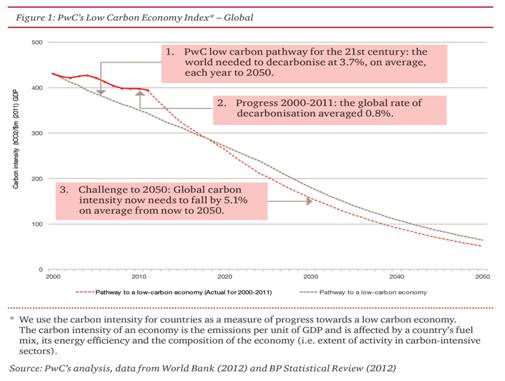 Unprecedented World Carbon Emissions Cuts Needed By 2050Nov 5, 2012
By Nina Chestney 
LONDON, Nov 5 (Reuters) - The world will have to cut the rate of carbon emissions by an unprecedented rate to 2050 to stop global temperatures from rising more than 2 degrees this century, a report released by PwC on Monday showed. PwC's annual Low Carbon Economy Index report examined the progress of developed and emerging economies towards reducing their carbon intensity, or their emissions per unit of gross domestic product. Global temperatures have already risen by about 0.8 degrees Celsius above pre-industrial times. Almost 200 nations agreed in 2010 at United Nations climate talks to limit the rise to below 2 degrees C (3.6 Fahrenheit) to avoid dangerous impacts from climate change. Carbon intensity will have to be cut by over 5 percent a year to achieve that goal, the study said. That compares with an annual rate of 0.8 percent from 2000 to 2011. "Because of this slow start, global carbon intensity now needs to be cut by an average of 5.1 percent a year from now to 2050. This rate of reduction has not been achieved in any of the past 50 years," it added. Climate scientists have warned that the chance of limiting the rise to below 2C is getting smaller. Global carbon emissions went up over 3 percent in 2011 to a record high, according to the International Energy Agency. SLOW PROGRESS Even if the 5 percent rate is achievable in the long term, decarbonisation will not be ramped up immediately, meaning that future cuts would have to be far more. "Even doubling our current rate of decarbonisation would still lead to emissions consistent with 6C warming by the end of the century," said Leo Johnson, PwC partner for sustainability and climate change. "To give ourselves a more than 50 percent chance of avoiding 2C will require a six-fold improvement in our rate of decarbonisation." According to the study, European Union countries had the highest rates of decarbonisation, with Britain, France and Germany all cutting carbon intensity by over 6 percent in 2010-2011. "The irony is that a key reason for lower energy use was the milder winter in the region. Both the UK and France also witnessed increased generation in low-emissions nuclear power, whereas Germany's exit from nuclear is reflected in its relatively lesser decline in emissions," PwC said. The United States experienced a 3.5 percent decrease in carbon intensity in 2011, mostly due to a shift to shale gas from coal in its fuel mix and more efficient vehicles. Decarbonisation in China and India in the last decade seems to have stalled, while Australia's carbon intensity grew by 6.7 percent last year and Japan's was up 0.8 percent. Although major economies have promised to cut carbon dioxide emissions, the pledges combined are insufficient to meet the 2C target, PwC said. It questioned whether some of the pledges can be met due to economic pressures. Nations will meet in Qatar at the end of this month for the next round of U.N. climate talks when they are supposed to discuss ways of ramping up their climate targets. (editing by Jane Baird)
|